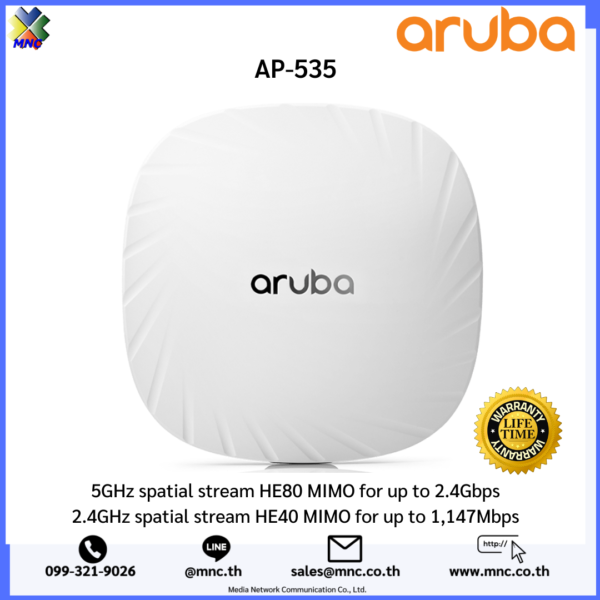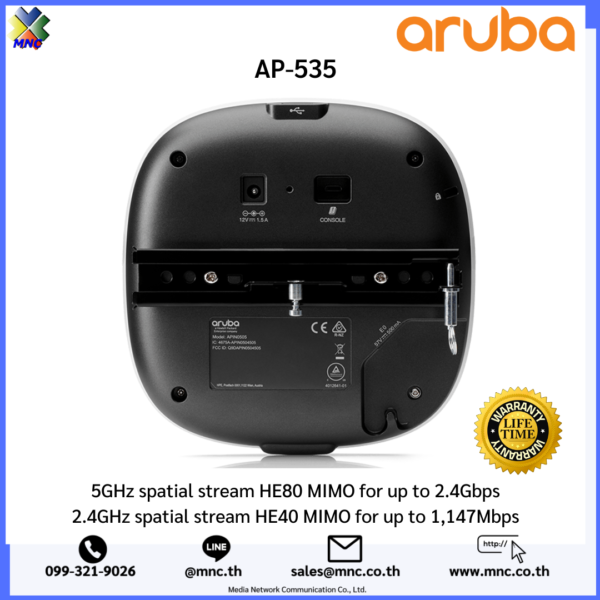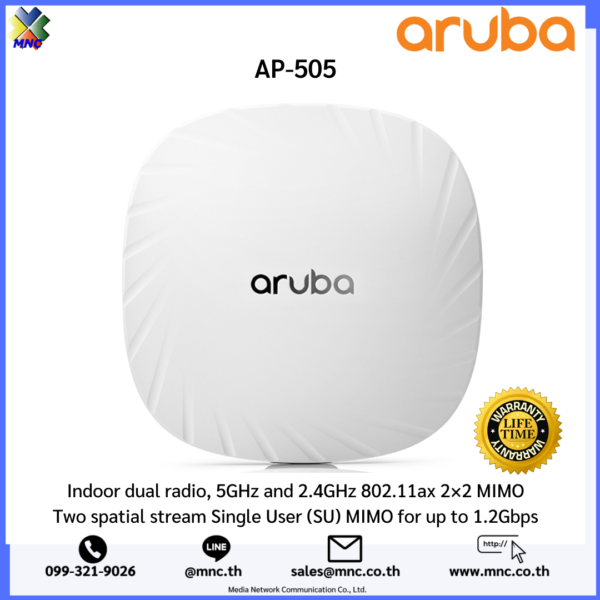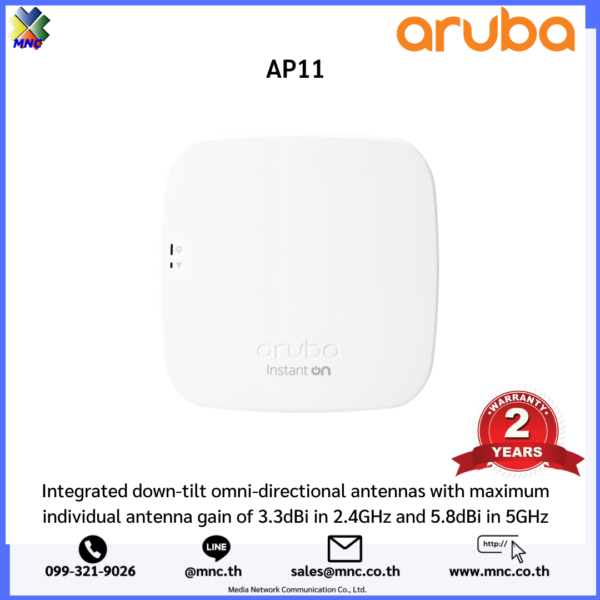คำอธิบาย
HPE Aruba Networking 530 Series Wi-Fi 6 Campus APs
WI-Fi 6-certified for high-performance connectivity across high-density deployments such as larger office spaces, training and meeting facilities, and hospitals.
Ultimate efficiency
Built on Wi-Fi 6 standards, 530 Series APs include features such as OFDMA, bidirectional uplink/downlink MU-MIMO, and Target Wake Time for better multi-user performance and improved efficiency.
IoT and location-ready
HPE Aruba Networking’s Wi-Fi 6 AP provides support for Zigbee, Bluetooth 5, and third party overlays to simplify the deployment and management of IoT services and provide telemetry for contact-tracing dashboards in HPE Aruba Networking Central.
Secure by design
Protects network security with stronger encryption and authentication, secure credentials/keys storage, and user and IoT access policy enforcement firewalls.
High speed. High performance indoor Wi-Fi 6 APs
Connectivity across high-density deployments such as larger office spaces, training and meeting facilities, and hospitals. Up to 2.97 Gbps maximum real-world speed and maximum of 1,024 associated clients per radio.
Wi-Fi 6 OFDMA and MU-MIMO, plus ClientMatch
Handles multiple clients on each channel, regardless of device or traffic type, using AI to eliminate sticky client issues.
Air Slice for SLA-grade performance
Provides service level agreement-grade performance for latency-sensitive, high-bandwidth, and IoT services.
WPA3 and Enhanced Open security
Increases enterprise-level security without increasing complexity, and ensures stronger guest access protections.
IoT-ready Bluetooth 5 and Zigbee support
Simplifies deploying and managing IoT location services, asset-tracking services, security solutions, and IoT sensors.
Flexible management options
Options to deploy in distributed or campus modes using a cloud-hosted or on-prem management and orchestration engine.
Green energy efficiency
Offers green AP mode with AI-powered energy savings of up to 70%.
Specifications
| Wi-Fi Radio Specifications |
- AP type: Indoor, dual radio, 5GHz and 2.4GHz 802.11ax 4×4 MIMO
- 5GHz radio: Four spatial stream HE80 (or 2SS HE160) MIMO for up to 2.4Gbps wireless data rate
- 2.4GHz radio: Four spatial stream HE40 (HE20) MIMO for up to 1,147Mbps (574Mbps) wireless data rate
- Support for up to 1,024 associated client devices per radio, and up to 16 BSSIDs per radio
- Supported frequency bands (country-specific restrictions apply):
- 2.400 to 2.4835GHz ISM
- 5.150 to 5.250GHz U-NII-1
- 5.250 to 5.350GHz U-NII-2A
- 5.470 to 5.725GHz U-NII-2C
- 5.725 to 5.850GHz U-NII-3/ISM
- 5.850 to 5.895GHz U-NII-4
- Available channels: Dependent on configured regulatory domain
- Dynamic frequency selection (DFS) optimizes the use of available RF spectrum
- Including Zero-Wait DFS (ZWDFS) to accelerate channel changes
- Supported radio technologies:
- 802.11b: Direct-sequence spread-spectrum (DSSS)
- 802.11a/g/n/ac: Orthogonal frequency-division multiplexing (OFDM)
- 802.11ax: Orthogonal frequency-division multiple access (OFDMA) with up to 37 resource units (for an 80MHz channel)
- Supported modulation types:
- 802.11b: BPSK, QPSK, CCK
- 802.11a/g/n: BPSK, QPSK, 16-QAM, 64-QAM, 256-QAM (proprietary extension)
- 802.11ac: BPSK, QPSK, 16-QAM, 64-QAM, 256-QAM, 1024-QAM (proprietary extension)
- 802.11ax: BPSK, QPSK, 16-QAM, 64-QAM, 256-QAM, 1024-QAM
- 802.11n high-throughput (HT) support: HT20/40
- 802.11ac very high throughput (VHT) support: VHT20/40/80/160
- 802.11ax high efficiency (HE) support: HE20/40/80/160
- Supported data rates (Mbps):
- 802.11b: 1, 2, 5.5, 11
- 802.11a/g: 6, 9, 12, 18, 24, 36, 48, 54
- 802.11n: 6.5 to 600 (MCS0 to MCS31, HT20 to HT40), 800 with 256-QAM
- 802.11ac: 6.5 to 1,733 (MCS0 to MCS9, NSS = 1 to 4, VHT20 to VHT160), 2,166 with 1024-QAM
- 802.11ax (2.4GHz): 3.6 to 1,147 (MCS0 to MCS11, NSS = 1 to 4, HE20 to HE40)
- 802.11ax (5GHz): 3.6 to 2,402 (MCS0 to MCS11, NSS = 1 to 4, HE20 to HE160)
- 802.11n/ac packet aggregation: A-MPDU, A-MSDU
- Transmit power: Configurable in increments of 0.5 dBm
- Maximum (aggregate, conducted total) transmit power (limited by local regulatory requirements):
- 2.4 GHz band: +24 dBm (18dBm per chain)
- 5 GHz band: +24 dBm (18 dBm per chain)
- Note: conducted transmit power levels exclude antenna gain. For total (EIRP) transmit power, add antenna gain.
- Advanced Cellular Coexistence (ACC) minimizes the impact of interference from cellular networks
- Maximum ratio combining (MRC) for improved receiver performance
- Cyclic delay/shift diversity (CDD/CSD) for improved downlink RF performance
- Space-time block coding (STBC) for increased range and improved reception
- Low-density parity check (LDPC) for high-efficiency error correction and increased throughput
- Transmit beam-forming (TxBF) for increased signal reliability and range
- 802.11ax Target Wait Time (TWT) to support low-power client devices
- 802.11mc Fine Timing Measurement (FTM):
- for precision distance ranging
|
| Wi-Fi Antennas |
- AP-534: Four (female) RP-SMA connectors for external dual band antennas (A0 through A3, corresponding with radio chains 0 through 3). Worst-case internal loss
between radio interface and external antenna connectors (due to diplexing circuitry): 0.8dB in 2.4GHz and 1.3dB in 5GHz.
- AP-535: Four integrated dual-band downtilt omni- directional antennas for 4×4 MIMO with peak antenna gain of 3.5dBi in 2.4GHz and 5.4dBi in 5GHz. Built-in antennas are optimized for horizontal ceiling mounted orientation of the AP. The downtilt angle for maximum gain is roughly 30 degrees.
- A mix of horizontally and vertically polarized antenna elements is used
- Combining the patterns of each of the antennas of the MIMO radios, the peak gain of the combined, average pattern is 1.9dBi in 2.4GHz and 3.5dBi in 5GHz.
|
| Other Interfaces |
- E0, E1: HPE SmartRate port (RJ-45, maximum negotiated speed 5Gbps)
- Auto-sensing link speed (100/1000/2500/5000BASE-T) and MDI/MDX
- 2.5Gbps and 5Gbps speeds comply with NBase-T and 802.3bz specifications
- POE-PD: 48Vdc (nominal) 802.3af/at/bt POE (class 3 or higher)
- 802.3az Energy Efficient Ethernet (EEE)
- Link aggregation (LACP) support between both network ports for redundancy and increased capacity
- POE power can be drawn from either port (single source, or set to prioritize) or both ports simultaneously (set to combine) When set to prioritize, the AP draws power from E0 and may failover to E1.
- DC power interface: 48Vdc (nominal, +/- 5%), accepts 1.35mm/3.5mm center-positive circular plug with 9.5mm length
- USB 2.0 host interface (Type A connector)
- Capable of sourcing up to 1A / 5W to an attached device
- Bluetooth 5.0 Low Energy (BLE5.0) and Zigbee (802.15.4)* radio
- BLE: up to 8dBm transmit power (class 1) and -95dBm receive sensitivity
- Zigbee: up to 8dBm transmit power and 99dBm receive sensitivity
- Integrated vertically polarized omnidirectional antenna with roughly 30 degrees downtilt and peak gain of 3.1dBi (AP-535) or 5.0dBi (AP-534)
- Visual indictors (two multi-color LEDs): for System and Radio status
- Reset button: factory reset, LED mode control (normal/off)
- Serial console interface (proprietary, micro-B USB physical jack)
- Kensington security slot
*Not initially supported; will be enabled in a future software release
|
| Power Sources and Power Consumption |
- The AP supports direct DC power and Power over Ethernet (POE; on port E0 and/or E1)
- When POE power is supplied to both Ethernet ports, the AP can be configured to combine or prioritize power sources
- When both DC and POE power sources are available, DC power takes priority over POE
- Power sources are sold separately; see the ordering Information section below for details
- When powered by DC, 802.3bt (class 5) POE or 2x 802.3at (class 4) POE, the AP will operate without restrictions.
- When powered by 1x 802.3at (class 4) POE and with the IPM feature disabled, the AP will disable the USB port and disable the other Ethernet port. In the same configuration but with IPM enabled, the AP will start up in unrestricted mode, but may dynamically apply restrictions depending on the POE budget and actual power. The feature restrictions and order can be programmed.
- Operating the AP with an 802.3af (class 3 or lower) POE source is not supported (except for AP staging; no radios will be enabled).
- Maximum (worst-case) power consumption:
- DC powered: 23.3W
- POE powered (802.3bt or dual 802.3at): 26.4W
- POE powered (802.3at, IPM disabled): 23.3W
- All numbers above are without an external USB device connected. When sourcing the full 5W power budget to such a device, the incremental (worst-case) power
consumption for the AP is up to 5.7W ( POE powered) or 5.5W ( DC powered).
- Maximum (worst-case) power consumption in idle mode: 13.3W ( POE) or 14.3W (DC)
- Maximum (worst-case) power consumption in deep-sleep mode: 3.8W (POE) or 3.6W (DC)
|
| Mounting Details |
- A mounting bracket has been pre-installed on the back of the AP. This bracket is used to secure the AP to any of the mount kits (sold separately); see the ordering Information section below for details.
|
| Mechanical Specifications |
- Dimensions/weight (AP-535; unit, excluding mount bracket):
- 240mm (W) x 240mm (D) x 57mm (H) / 9.4″ (W) x 9.4″ (D) x 2.1″ (H)
- 1,270g / 44.8oz
- Dimensions/weight (AP-535; shipping):
- 285mm (W) x 300mm (D) x 105mm (H) / 11.2″ (W) x 11.9″ (D) x 4.1″ (H)
- 1,930g / 68.1oz
|
| Environmental Specifications |
- Operating conditions
- Temperature: 0C to +50C / +32F to +122F
- Humidity: 5% to 93% non-condensing
- AP is plenum rated for use in air-handling spaces
- ETS 300 019 class 3.2 environments
- Storage and transportation conditions
- Temperature: -40C to +70C / -40F to +158F
- Humidity: 5% to 93% non-condensing
- ETS 300 019 classes 1.2 and 2.3 environments
|
| Reliability |
- Mean Time Between Failure (MTBF): 995,000hrs (114yrs) at +25C operating temperature.
|
| Regulatory Compliance |
- FCC/ISED
- CE Marked
- RED Directive 2014/53/EU
- EMC Directive 2014/30/EU
- Low Voltage Directive 2014/35/EU
- UL/IEC/EN 60950
- EN 60601-1-1, EN60601-1-2
- Railway Certs (AP-535 Only):
- EN 50155:2017 – Railway Applications
- EN 50121-1:2017 – Railway EMC
- EN 50121-3-2 – Railway EMC
- EN 50121-4:2016 – Railway Immunity
- IEC 61373 ed2:2008 – Railway Shock and Vibration
- For more country-specific regulatory information and approvals, please see your HPE Aruba Networking representative.
|
| Regulatory Model Numbers |
- AP-534: APIN0534
- AP-535: APIN0535
|
| Certifications |
- UL2043 plenum rating
- Wi-Fi Alliance:
- Wi-Fi CERTIFIED a, b, g, n, ac
- Wi-Fi CERTIFIED ax1
- WPA, WPA2 and WPA3 – Enterprise with CNSA option, Personal (SAE), Enhanced Open ( OWE)
- WMM, WMM-PS, W-Fi Agile Multiband
- Wi-Fi Location2
- Passpoint (release 2)
- Bluetooth SIG
- Ethernet Alliance (POE, PD device, class 4)
|
| Minimum Operating System Software Versions |
- ArubaOS and Aruba InstantOS 8.5.0.0
- ArubaOS 10.0.0.0
|
Warranty
- Life Time Carry-in Year warranty by HPE Aruba Thailand (5 ปีหลังเลิกผลิต)
Download
Product Datasheet








